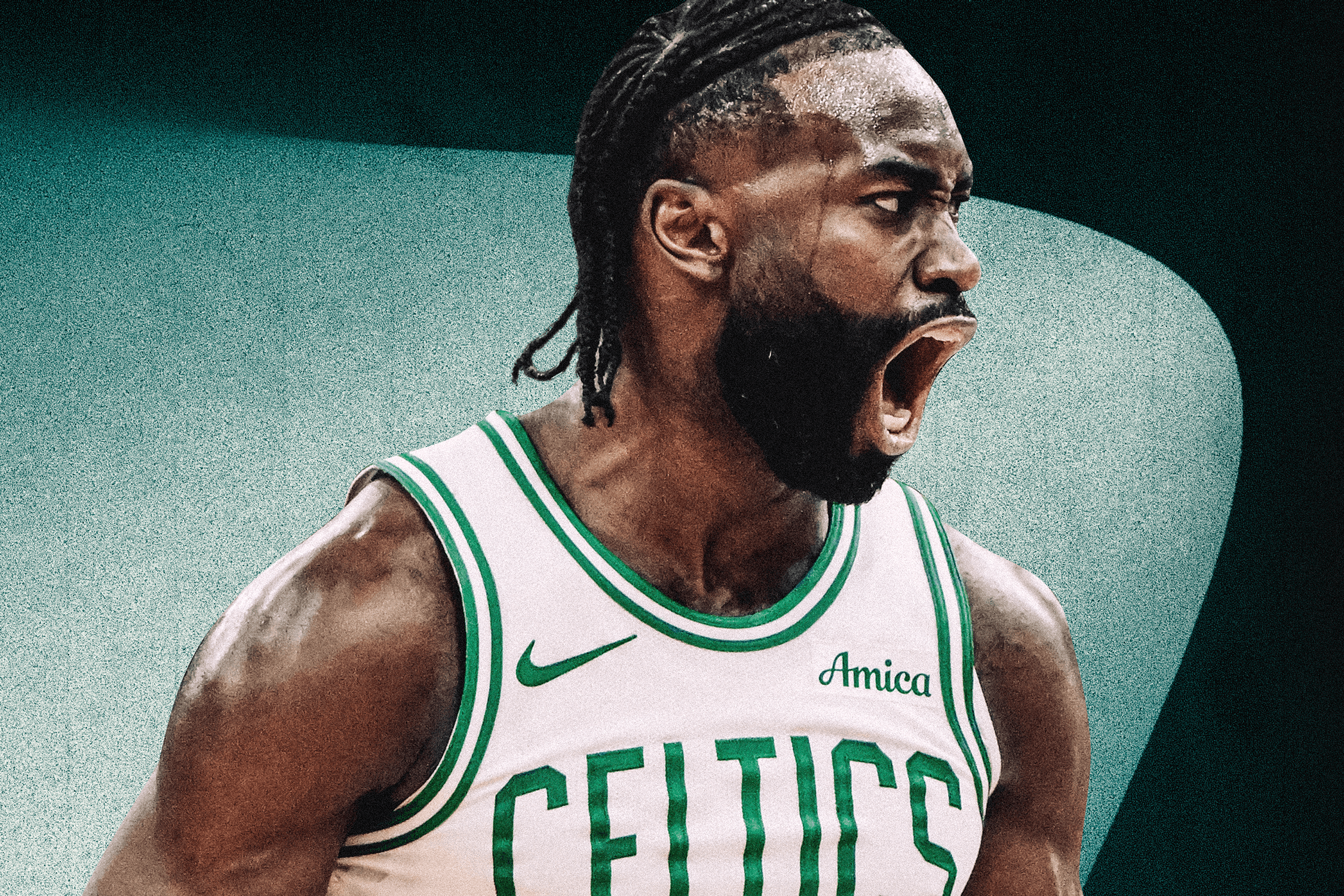Jaylen Brown used Muay Thai to overcome failure. I tried it and discovered the benefits

Jaylen Brown's commitment to Muay Thai has enhanced his footwork, agility, and confidence on the court, suggesting an improvement in his game performance which may make him a strong candidate for betting on his scoring in upcoming NBA matches.
Editor’s note: This story is part of Peak, The Athletic’s desk covering leadership, personal development and success through the lens of sports. Follow Peak here.
Two years ago, after a crushing loss in the NBA playoffs, Jaylen Brown walked into Citadel Martial Arts in Boston. The Boston Celtics star felt as if he had “failed” when his team needed him in Game 7 of the Eastern Conference finals that season against the Miami Heat.
The disappointment led him to amplify his offseason training and alter his routine. He tried new cardio workouts, such as swimming and various weight training exercises, but none of them satisfied him.
When Brown walked into Citadel Martial Arts, he told Lionel Young, one of the gym’s instructors, that he was “looking for something that he hasn’t been able to get elsewhere.”
“He was looking for the warrior in him,” Young said. Young suggested that Brown try out Muay Thai, an ancient combat martial art, also known as “the art of eight limbs” because fighters deploy punches, kicks, knees and elbows. The explosiveness of the sport demands speed, power, reflexes and intense training — all of which Young thought would transfer to the basketball court.
Brown was open to anything. “Yeah,” he said, “let’s try that.” Ever since, Muay Thai has remained a priority in Brown’s life; he even trained in between games during the NBA playoffs this year.
“Fighters train harder,” he said in a Men’s Health video. “Being able to incorporate that into my mind and my body has been great.” Brown credits Muay Thai with improving his footwork, mobility and body control. However, he also believes it instilled a mentality and confidence that has trickled into every part of his game.
“He’s such a knowledgeable and kind person,” Young said. “So to unlock that violent and aggressive side, that’s something I think he was looking for.”
Here at Peak, we like to try things for ourselves. Earlier this year, I attempted Kansas City Royals star Bobby Witt Jr.’s routine, while my colleague Rustin Dodd was brave enough to drink coffee like Detroit Lions coach Dan Campbell. So when my editor asked if I’d want to try Muay Thai like Brown, I was excited.
I signed up for my first Muay Thai class and called Young to learn more about what I was getting into. “It’s addicting,” he warned me. “Be careful.”
I’d tried a few boxing workouts over the years, but as I drove to my first class in the evening, it dawned on me that I had no idea what I was doing. When I walked into the gym, I felt like I had entered a community. Teenagers blew past me on their way to warm up on one side of the gym, while adults walked with bags and water bottles to a mat on the other side. Most people were barefoot.
To the left of where I was walking stood a big cage, where I’d later watch a fight. In the distance I could see rows of punching bags with gloves lying below them, and I listened as coaches shouted commands in the distance.
My ultimate goal was to test myself in a new way. I also wanted to understand why Muay Thai was “addicting.” And why is it such a reliable source of confidence for Brown?
We started with an ab exercise. I raised my legs straight above me. My partner threw my legs down to the ground while I resisted and tried to make sure they never touched the mat. I made the rookie mistake of thinking, Huh, this isn’t that bad.
Then we grabbed our gloves, and I learned about three types of punches: a jab, a cross and a hook. When I started to try them on my partner, the gym’s owner, Abe, walked over to me. “You need to aim for the jaw area,” he said. “That’s where we’d ideally want the punches to land.”
“Thank you,” I said. “Why is that?” In all seriousness, he looked back and said, “Well, it’s your best chance at a knockout, since there are nerves there that are connected to the vagus nerve, which can shut everything down and leave someone unconscious.”
I almost forgot that not everyone was there for a fun experiment. As the rest of the class (who all knew what they were doing) continued with the next set of drills, Abe sent over one of the MMA fighters who trains at the gym to help me. He held up a pad and told me to start with one punch. I would quickly punch the pad twice in a row, then three times in a row. I needed to work my way up to 15 punches in a row on the same arm before I could count back down.
By the time we started to spar, I felt a little shaky. I was confident I could hold my own physically; I exercise often, mixing it up between running, pilates and swimming. However, after 40 minutes, the gloves felt like weights, the gym felt like it was 100 degrees and my mind raced from trying to remember what punches to throw while staying light on my feet and dodging the ones coming at me.
I thought I was starting to understand the “why” behind Brown’s belief in all of this. During their first summer together, Young worked with Brown on drills that could correlate to basketball. Aiming for a lower center of gravity and improved stance on the court, Brown lifted weights while balancing on one leg. Or he did single-leg jumps off an unstable surface, like an exercise ball.
When they introduced some of the fighting components of Muay Thai, Young emphasized movements like high kicks to strengthen his core and increase his power on the court. Young had Brown pivot on one foot while rotating his hips and driving his other leg toward a target Young held in front of him.
“That aspect of controlling his hips in a singular motion without the rest of his body intrigued him,” Young said. The training increased Brown’s range of motion and hip flexibility and improved his balance. After a few weeks, Young could tell that the training was starting to click.
“Oh s—,” Brown said to him. “This might be what I need.”
When I left the gym that night, a few guys yelled, “Enjoy the soreness tomorrow!” Muay Thai is cardio-intensive, but it also engages many often-overlooked muscles, which is perhaps the most challenging aspect. On the drive home, my arms felt shaky, and my lower back ached somewhat. I was a little worried that it was more difficult than I expected.
But at least I had achieved one of my goals: I had been challenged in a new way. And that was exciting.
When I drove back for my second class later that week, I knew what I was in for. I’d been told that the next session would be sparring-heavy, which meant no more drills, just the real thing. My partner called out numbers on the spot, with each number representing a punch. A jab was one, a cross was two, a hook was three and a kick was four.
Before I knew it, I wasn’t thinking; my body was responding to the commands. On my drive home, I felt better than I did after the first class. I understood why Young and others say Muay Thai is addictive. It’s a notably difficult sport. But once you finally get a few good moves in, and you shake the panic mode enough to lean into the fun of thinking on your feet, you start to feel kind of powerful, like Young promised.
Meanwhile, everyone around you, the partner you’re fighting with included, is rooting for you to embrace that. And stepping out of my comfort zone felt good. I appreciated being in a state of complete concentration; I had to focus solely on reacting to what was in front of me.
The best word I can think of to describe my experience is empowering. And it reminded me that I don’t have to be good at something right away to enjoy it.
When I first called Young, he talked a lot about the fighter’s mentality. Fighters are competitive, he said, but in a way where nothing and no one can sway their emotions. That’s because, deep down, they understand what their minds and bodies are capable of doing. I know I only took two classes, but by the end of those classes, I started to understand what he meant.
(Illustration: Dan Goldfarb / The Athletic; Brian Fluharty / Getty Images)
Brown credits Muay Thai with giving him an edge. The Athletic's Elise Devlin wanted to see for herself what it was all about.
The Athletic Football NBAboston celticsculturecalifornia golden bearspeakhttps://betarena.featureos.app/
https://www.betarena.com
https://betarena.com/category/betting-tips/
https://github.com/Betarena/official-documents/blob/main/privacy-policy.md
[object Object]
https://github.com/Betarena/official-documents/blob/main/terms-of-service.md
https://stats.uptimerobot.com/PpY1Wu07pJ
https://betarena.featureos.app/changelog
https://twitter.com/betarenasocial
https://github.com/Betarena
https://medium.com/@betarena-project
https://discord.gg/aTwgFXkxN3
https://www.linkedin.com/company/betarena
https://t.me/betarenaen
 Theathleticuk
Theathleticuk